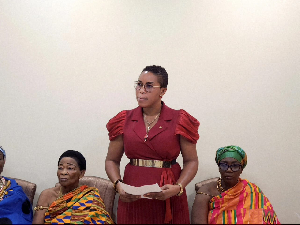Apam (C/R), Feb. 20, GNA - Mr Charles Aikins, an HIV positive patient, has called on the public to put an end to stigmatization and discrimination against people living with the disease to enable effected persons freely disclose their status.
He said the negative attitude towards people with HIV was negatively affecting efforts aimed at preventing the spread of the disease Mr Aikins was speaking at a workshop organized by the Gomoa District AIDS Committee for members of the assembly at Apam on Friday. He said people refused to go for voluntary testing for HIV/AIDS for fear of being humiliated if they tested positive and those already infected did not go for counselling for the same reason. Miss Joyce Mildred Aidoo, the District Chief Executive (DCE), said the government was committed to the fight against HIV/AIDS hence 15 per cent of the health budget was reserved for the prevention of the spread of the pandemic.
Miss Aidoo said as at December 2003, Ghana AIDS Commission had approved a total of 2658 proposals on how to fight the disease, which were being implemented by ministries, departments, agencies and civil organizations throughout the country. More
Miss Aidoo said the government has decided to absolve 90 per cent of the price of antiretroviral drugs for 2000 people living with HIV/AIDS. The DCE noted that the workshop was significant because it provided the requisite information to assembly members to enable them contribute effectively to the fight against HIV/AIDS.
Speaking on "the national response-the role of the assembly member," Mr Paul Djan, Central Regional Population Officer, appealed to the Ghana AIDS Commission to re-assess its strategies and policies to find out the impact on preventing the spread of the disease.
He said impact on behavioural change was low because some members of the Commission did not work in consonance with socio-cultural norms. Mr Djan expressed concern about the inability of the Commission to use structures of National Population Council in the fight of the disease and said this had resulted in setting up of parallel committees to perform the same functions.
He urged assembly members to enact by-laws to abolish socio-cultural norms, which militated against the fight against HIV/AIDS.
Mr Eric Akobeng, the District HIV/AIDS Focal Person, said the District Medium Term Strategic Plan for 2001-2005 had targeted to reduce HIV/AIDS infection rate of three per cent in the district by 30 per cent.
Mr Akobeng said to be able to achieve this, it would require political commitment and support for HIV/AIDS programmes, and development of HIV/AIDS data base. 20 Feb. 04
Regional News of Saturday, 21 February 2004
Source: GNA












